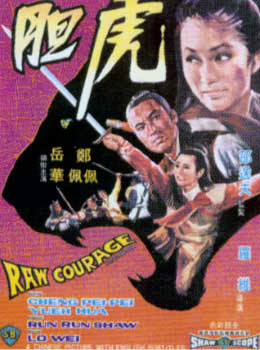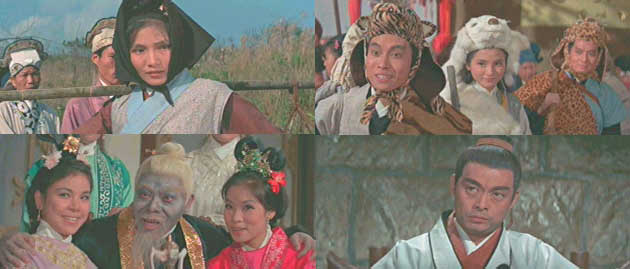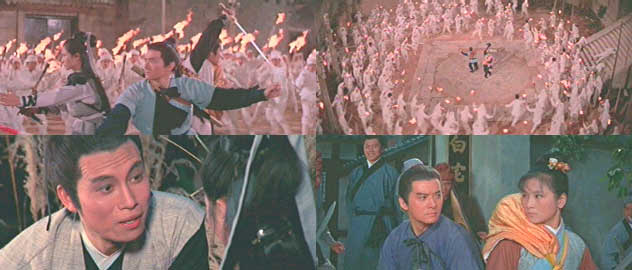Raw Courage

Director: Lo Wei
Year: 1969
Rating: 6.5
Cheng Pei-pei did
so many films with director Lo Wei that one has to wonder if he had compromising
pictures of her. None of these collaborations are great films, but they
do provide some entertainment and a few thrills and we should be grateful
to Lo Wei for using her as much as he did. I am just curious as to the working
dynamics of this relationship – did he have first rights to her services,
did other directors not want to use her, did Shaw mandate that she do nothing
but Wuxia films? At the time these were made in the mid to late 1960’s the
modern Wuxia film was still really in its technical infancy and it wasn’t
until the next decade before Chor Yuen gave these kinds of films their more
graceful seamless Shaw style. By that time though, both Cheng Pei-pei and
Lo Wei had left the studio though they were to team up again in a few other
films outside of Shaw. It would have been interesting to have seen Cheng
Pei-pei in a Chor Yuen production though he seems to have preferred sleek
chilly actresses like Lily Ho.

I do think that with all these Lo Wei films being released – not just the
Cheng Pei-pei ones but also some of his others – that his career as a film
director will be reassessed in a more favorable light. Certainly he was not
a visionary or a groundbreaker, but he was not a hack either as many have
written. He was more of a studio hired hand to take on whatever was assigned
to him, a competent journeyman director with a nice eye for sumptuous design,
glistening visuals and beautiful women. Interestingly, these elements were
very much missing in the Bruce Lee and Jackie Chan films for which his reputation
was so maligned. Perhaps he was not comfortable in the kung-fu genre - and
certainly the weakest part of his Shaw films is the often poorly choreographed
action scenes – or he just didn’t have the budgets and infrastructure that
he needed. One would never think the same director was behind both the lavish
James Bond type film, "The Golden Buddha" and the bare to the bones Jackie
Chan film, "Shaolin Wooden Men". The other thing that Lo Wei has to be credited
with was his willingness to use females in action roles – not something
that Shaw was doing a lot of in the 1960’s. Not only with Cheng Pei-pei but
he also made the two Angel films with Lily Ho as a secret agent and after
leaving Shaw, he made some terrific films with Polly Shang-kwan. And the
women in these films tended to be all business as he kept romance and sexuality
very much in the background. Lo Wei the feminist!

This is a fairly high budgeted film with good production values, big sets,
hundreds of extras and numerous large-scale action scenes. This is also perhaps
the weakness of the film because it lacks a sense of intimacy, character development
or variation. This is especially true of the action sequences – they are
all very similar with a small band of heroes taking on a large group of bad
guys and killing a whole lot of them. The film needed a few change ups thrown
in there – some good one on one fights spotlighting the skills of the performers
would have been welcome. Still one shouldn’t complain about too much action
and the myriad of fight scenes builds up to an excellent final fifteen minutes
of well-stylized action.

The palace walls of Ming Emperor Jianwen (1398-1402) are being breeched
by a hoard of rebels under his uncle Yongle and seeing disaster ahead he
gives his infant son over to Hero Shangguan (Lo Wei) for protection and hopefully
to regain the thrown in the future before he sets his palace on fire and dies
in the inferno. Shangguan is the head of the Black Dragon Society and they
are soon accused by Tien Feng and the East Side Gang of hiding the son of
Jianwen. When Shangguan refuses to hand over the baby, his society is attacked
and nearly all are killed except his daughter (Cheng Pei-pei) and his nephew
(Wu Fung). These two escape taking the baby with the intention of delivering
him to Shangguan’s brother seventy miles to the south. To get there they
have to pass through many blockades with Tien Feng and his deadly female
dart-throwing companion constantly on their heels. On the way they pick up
the assistance of the king of beggars (Yeung Chi Hing), his sister (Ouyang
Shafei), a small girl and two beggar disciples (Li Kun and Yueh Hua).

Most of the film consists simply of the trio of Cheng Pei-pei, Wu Fung and
Yueh Hua making their way to their destination to deliver the emperor’s son
and trying to avoid detection through various disguises all along the way
– but unfortunately there is no way to disguise a baby's cries and you can
count on this baby crying at all the wrong times. Whenever that happens, the
disguises get dropped and the swords come out as they chop their way through
numerous opponents with the baby strapped securely to Cheng Pei-pei’s back.
The action is a bit chaotic and frenzied with a large body count, but generally
is of the wild swinging/bodies running into sword variety – but it is still
fun to see Cheng Pei-pei wielding her sword with determination and having
five guys go down with one stroke. My favorite part is at the end when all
the good guys and all the main bad guys end up in one place with a fight
to the death impending – and the old beggar king says, “Kids, kill them”
which they then proceed to do.

Sadly, it appears that the baby never did become emperor – if he existed
at all that is. Yongle who was the son of the first Ming Emperor (Hongwu)
ruled from 1402 to 1424 as the third Ming emperor and is considered by those
in the know to be one of the great rulers in Chinese history. Jianwen was
actually only 25-years old when he died - though in the film an elderly actor
plays him. For more information on this period, click here.

Trailer







